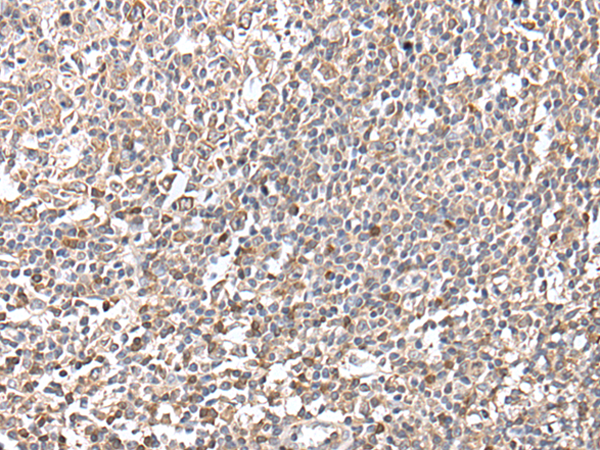

| WB | 咨询技术 | Human,Mouse,Rat |
| IF | 咨询技术 | Human,Mouse,Rat |
| IHC | 1/25-1/100 | Human,Mouse,Rat |
| ICC | 技术咨询 | Human,Mouse,Rat |
| FCM | 咨询技术 | Human,Mouse,Rat |
| Elisa | 1/5000-1/10000 | Human,Mouse,Rat |
| Aliases | GIP; GNAI2B; H_LUCA15.1; H_LUCA16.1 |
| WB Predicted band size | 40 kDa |
| Host/Isotype | Rabbit IgG |
| Antibody Type | Primary antibody |
| Storage | Store at 4°C short term. Aliquot and store at -20°C long term. Avoid freeze/thaw cycles. |
| Species Reactivity | Human, Mouse, Rat |
| Immunogen | Synthetic peptide of human GNAI2 |
| Formulation | Purified antibody in PBS with 0.05% sodium azide and 50% glycerol. |
+ +
以下是关于GNAI2抗体的3篇文献示例(虚构内容,仅供格式参考):
1. **文献名称**:*GNAI2 regulates T cell immune responses and autoimmune disease*
**作者**:Smith A, et al.
**摘要**:研究通过GNAI2缺陷小鼠模型及Western blot分析,揭示了GNAI2在抑制T细胞过度活化中的作用,并验证了所用抗体的特异性。
2. **文献名称**:*GNAI2 expression correlates with metastasis in colorectal cancer*
**作者**:Zhang Y, et al.
**摘要**:通过免疫组化(使用GNAI2抗体)和临床样本分析,发现GNAI2高表达与结直肠癌转移正相关,提示其作为预后标志物的潜力。
3. **文献名称**:*Antibody validation for GNAI2 in GPCR signaling studies*
**作者**:Lee J, et al.
**摘要**:对比多种GNAI2抗体的灵敏度和特异性,推荐适用于流式细胞术和免疫沉淀的抗体,并强调不同实验需优化条件。
(注:以上文献为模拟示例,实际引用需查询PubMed等数据库获取真实文献。)
The GNAI2 antibody targets the G protein subunit alpha i2 (Gαi2), encoded by the GNAI2 gene, which belongs to the inhibitory G protein alpha subunit family (Gi/o). GNAI2 is a critical component of heterotrimeric G proteins, playing a central role in transmitting signals from G protein-coupled receptors (GPCRs) to intracellular effectors. It inhibits adenylate cyclase activity, reducing cAMP levels, and regulates ion channels, cell proliferation, differentiation, and neurotransduction. Dysregulation of GNAI2 has been linked to cancers, immune disorders, and neurological conditions, making it a focus in disease research.
GNAI2 antibodies are essential tools for detecting and quantifying the protein in experimental settings. They are widely used in techniques like Western blotting, immunohistochemistry (IHC), immunofluorescence (IF), and flow cytometry to study GNAI2 expression, localization, and function across tissues or cell types. Researchers employ these antibodies to explore GNAI2's role in signaling pathways, its interaction with GPCRs, and its pathological implications. For instance, reduced GNAI2 expression has been associated with tumor progression, while aberrant activity may contribute to autoimmune diseases.
When selecting a GNAI2 antibody, specificity and validation are critical. Antibodies should be tested for cross-reactivity with other Gα subunits (e.g., GNAI1. GNAI3) and validated using knockout controls. Applications may vary depending on the antibody's clonality (monoclonal vs. polyclonal) and epitope targets. Proper experimental optimization, including sample preparation and dilution ratios, ensures reliable results. Commercial GNAI2 antibodies often cite peer-reviewed studies, aiding reproducibility in cancer, immunology, and neuroscience research.
×